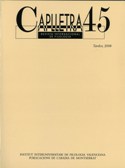La voluntat de comunicar com a objecte primordial en l'aprenentatge d'una L2
DOI:
https://doi.org/10.7203/caplletra.45.4795Palabras clave:
learning goals, second language, language contact, attitudes, prejudices, motivations, willingness to communicate, communicative competence, communicative behaviour, communicative confidence, teacher training, educational policies, linguistic centre proje Resumen
Resumen
Although evidence has shown that psychosocial factors have a decisive influence in second language learning, it has not been highlighted the importance they have regarding educational practice, the design of learning programs or teacher training.
The model known as Willingness to Communicate, developed by MacIntyre et al. (1998) from numerous empirical works, points at the factors that favor authentic use in the learning of a second language and the relationships among them. The goal of
a language course can not be limited to developing communicative competence but has to be aimed at increasing the willingness to communicate actively. Following this theoretical model, one of its authors, Zoltán Dörnyei (2001), has devoted one of his books to the development of practical strategies of motivation in the language classroom. These approaches are specially useful for contexts of linguistic concurrence like ours, especially at a moment in which school multilingualism is promoted.
 Descargas
Descargas
Descargas
Publicado
Cómo citar
-
Resumen469
-
PDF (Català)203
Número
Sección
Licencia
El autor o autora que dirija un trabajo a la redacción de Caplletra para ser publicado tiene que ser la persona titular legítima de los derechos de explotación. La legitimación para la publicación del trabajo tiene que incluir también las imágenes, las tablas, los gráficos y otros materiales que puedan complementar el texto, con independencia de si es su autor o autora.
Copyright. Al publicar el trabajo en la revista, el autor o autora cede a Caplletra. Revista Internacional de Filologia los derechos de explotación (reproducción, distribución y comunicación pública), tanto para la edición impresa en papel como para la versión electrónica.
Todos los trabajos publicados en Caplletra se encuentran bajo una licencia Creative Commons del tipo Reconocimiento-NoComercial-SinObraDerivada 4.0.
RESPONSABILIDAD
Caplletra. Revista Internacional de Filologia no se identifica necesariamente con los puntos de vista sostenidos en los trabajos que publica.Caplletra. Revista Internacional de Filologia declina toda responsabilidad derivada de cualquier vulneración eventual de los derechos de propiedad intelectual que pudiera ser llevada a cabo por los autores o autoras.






